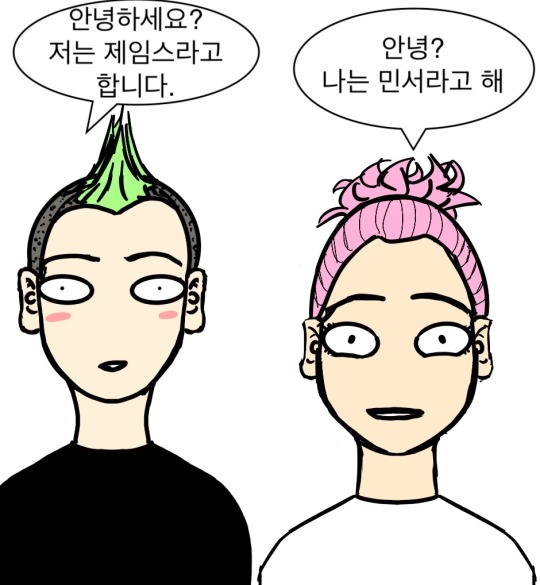#밀크코코아 코리언
Today, I thought we should add a new hanja to the list: 力 - 힘 력/역. So, 力 means 힘 (power) and it is pronounced as 력(역 when it’s at the beginning of a word - but that is less common). 력 is a very common hanja in Korean. So, it’s great to be able to recognize it when words have something to do with strength, power or ability (strength to do something).
Here are common words seen with 力(힘 력/역).
집중력 ability to focus / 기억력 memory (ability to remember) 노력 effort (strength to put in effort, try, work) / 폭력 violence / 권력 power, authority / 능력 capability (power to be able to something) / 협력 cooperation (ability to work together) / 매력 charm (power to captivate, charm someone) /실력 ability (power of a skill) / 체력 strength, stamina (strength of the body) / 창의력 creativity (ability to be creative) / 중력 gravity /시력 eyesight (strength of the eyes) / 이해력 ability to understand something
Here are some example sentences.
우와 10년 전에 일어난 일을 그렇게 잘 기억해? 기억력이 대단하네. Wow, you can remember that thing that happened ten years ago that well? Your memory is amazing.
노력하면 다 잘 될 거야. If you try(put in effort), it will all work out.
그 여자는 매력적이에요. That woman is really charming.
어제 밤에 클럽 가고 나서 오늘 아침에 출근했다고? 헐 니 체력이 쩔어 ㅋㅋ You went to work this morning after going to a club last night?
우리 언니는 이해력이 좋아서 어려운 시험 문제를 쉽게 풀 수 있어요. My older sister’s ability to understand things is really good, so she can easily solve difficult test problems.
능력 and 실력 are two words that often confuse people since they can both be translated to ability or capability. They are quite similar, but still different. 능력 can be seen as an ability a little more innate or something that you’re born with, while 실력 is something you can improve or aquire. Which is why 능력 is normally used with 있다 and 없다 because you either have it or you don’t. But, 실력 can be used with words like 좋다, 나쁘다, 있다 and 없다. Because you can also acquire skills if you put in effort.
우리 팀장님은 진짜 능력이 있으세요. 실수 한번도 하신 적 없어요. Our team manager is really capable. She has never even made one mistake.
요즘 너 한국어 실력이 진짜 좋아지고 있는 것 같아. These days it seems like your Korean skills are really improving.
And do you remember the hanja 없을 무? 무 can be added to the word 중력 (gravity) to become 무중력 (zero gravity).
Next time you see 력 in a vocabulary word, ask yourself if it has anything to do with strength or power. Even take a moment to look it up! Hanja often helps me understand the true meaning of different vocabulary and remember them better. So, I hope it helps you too!
Good luck studying.
Follow me for more Korean tips and lessons~ and content.^^
Post link
Hi guys~ I made a tea rating system for my posts so that you can know right away what level you’re going to be reading. I hope it’s useful. Today, I’m going to be talking about introducing yourself in Korean for both beginners and intermediate Korean learners. So, I’ll start by saying hi.

Thankfully, introducing yourself in Korean is pretty easy. Beginners can use a basic 안녕하세요? (Hello) and then your name +이에요/예요.
And the difference between 이에요 and 예요 is easy.
이에요 is used if your name ends in a consonant sound(ㄱㄴㄷㄹㅁㅂㅅㅇㅈㅊㅋㅌㅍㅎ) and 예요 is used after a vowel sound (ㅏㅓㅗㅜㅡㅣㅐㅔㅚㅟㅢㅑㅕㅛㅠㅒㅖㅘㅝㅙㅞ).
Here are some examples and ways to introduce yourself.

안녕하세요? 저는 김수빈이에요. Hello, I’m Subin Kim.
*수빈 ends with the consonant ㄴ, so 이에요 must be used.
안녕하세요? 저는 수호예요. Hello, I’m Suho.
*수호 ends with the vowel ㅗ, so 예요 must be used.
Or, you can use the words 제 이름 (my name) like in the picture above.
안녕하세요? 제 이름은 김수빈이에요. Hello, my name is Subin Kim.
안녕하세요? 제 이름은 수호예요. Hello, my name is Suho.
입니다 is used in formal speeches or maybe at a company, or sometimes between men. (Women don’t use it as often in informal situations). You might see it often on the news or when idols introduce themselves on TV shows.
For example:
안녕하세요? 저는 유키입니다. Hello, my name is Yuki.
Or you can use the more advanced phrase (이)라고 하다 (I am called).

안녕하세요? 저는 알리라고 해요. Hello, I’m called Allie.
*알리 ends in the vowel ㅣ, so 라고 하다 is used.
안녕하세요? 저는 동석이라고 해요. Hello, I’m called Dongseok.
*동석 ends in the consonant ㄱ, so 이라고 하다 is used.
As with the first introductions, 라고 하다 is attached to names that end in a vowel, and 이라고 하다 is attached to names that end in a consonant.
“I’m called NAME” might sound a little awkward in English, but it’s a really common way to introduce yourself. *The phrase “name(이)라고 부르다(불러요)” is taught in some books, but is not a common introduction. You might use it to say: My name is Thomas, but please call me Tom. 제 이름은 토마스지만 톰이라고 불러 주세요.*
For school clubs or slightly more formal introductions, it’s common to use the formal version of (이)라고 하다, which is (이)라고 합니다. It’s used often if you’re introducing yourself in front of many people at one time like when joining a school club or being forced to introduce yourself to a class.
For example:
안녕하세요? 저는 제임스라고 합니다. Hello, I’m called James.
And now you might be wondering about an informal way to introduce yourself. Well, I’ve got you covered. You can say 안녕 (informal hi) and then you can add 이야 to the end of your name if it ends with a consonant and 야 to the end of your name if it ends in a vowel.
Or you can use the intimate speech level with (이)라고 하다, which is (이)라고 해.

For example:
안녕? 나는 수호야. Hi, I’m Suho.
안녕? 나는 동석이야. Hi, I’m Dongseok.
안녕? 내 이름은 알리야. Hi, I’m Allie.
안녕? 나는 민서라고 해. Hi, I’m called Minseo.
But, honestly, unless you were meeting a child, you probably wouldn’t introduce yourself this way. And even then, the child wouldn’t use your name, so you might not even say it. Even though it’s common to use informal speech (반말) to people younger than you, most people start talking in formal speech because it is polite, and you’re not close yet.
But people who meet in elementary to high school might greet this way, because they know their classmates are the same age as they are. So, you’ll see this informal introduction in high school dramas or webtoons.
And if you’ve read to this point, you’re probably thinking all this is great, but there are so many options. What one do I use? So, here’s my personal opinion. I think the best two options on this list are 저는 ㅇㅇ예요/ㅇㅇ이에요 for beginners and 저는 ㅇㅇ(이)라고 해요 for anyone. The first one is simple and absolutely acceptable, and the second one, while being extremely common, sounds a bit more advanced and natural. So, you can show off your skills a bit. And if you’re introducing yourself in front of a class or something, 저는 ㅇㅇ(이)라고 합니다 is a great choice.
If you have any questions, leave a comment.
And follow me for useful Korean lessons and tips!^^
Post link



